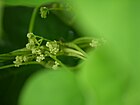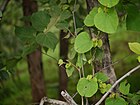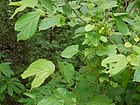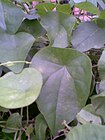Note: This is a project under development. The articles on this wiki are just being initiated and broadly incomplete. You can Help creating new pages.
Difference between revisions of "Cissampelos pareira - Laghu patha"
| (4 intermediate revisions by 2 users not shown) | |||
| Line 1: | Line 1: | ||
[[File:Cissampelos pareira (3777429965).jpg|thumb|right|''Cissampelos'', '' Patha'']] | [[File:Cissampelos pareira (3777429965).jpg|thumb|right|''Cissampelos'', '' Patha'']] | ||
'''Laghu Patha''' is a genus of flowering plants in the family Menispermaceae. The species is also known as abuta and is also called laghu patha in Ayurvedic medicine. The herb is widely found in India, Sri Lanka and other countries in the Asian subcontinent. | '''Laghu Patha''' is a genus of flowering plants in the family Menispermaceae. The species is also known as abuta and is also called laghu patha in Ayurvedic medicine. The herb is widely found in India, Sri Lanka and other countries in the Asian subcontinent. | ||
| − | |||
==Uses== | ==Uses== | ||
{{Uses|Gynecological problems}}, {{Uses|Skin ailments}}, {{Uses|Stimulates urine production}}, {{Uses|Colic}}, {{Uses|Fever}}, {{Uses|Cough}}, {{Uses|Amoebiasis}}, {{Uses|Diarrhea}}, {{Uses| Ulcers}} | {{Uses|Gynecological problems}}, {{Uses|Skin ailments}}, {{Uses|Stimulates urine production}}, {{Uses|Colic}}, {{Uses|Fever}}, {{Uses|Cough}}, {{Uses|Amoebiasis}}, {{Uses|Diarrhea}}, {{Uses| Ulcers}} | ||
| Line 56: | Line 55: | ||
==Commonly seen growing in areas== | ==Commonly seen growing in areas== | ||
| − | {{Commonly seen|Tropical}}, {{Commonly seen|Subtropical}}. | + | {{Commonly seen|Tropical area}}, {{Commonly seen|Subtropical area}}. |
==Photo Gallery== | ==Photo Gallery== | ||
<gallery class="left" caption="" widths="140px" heights="140px"> | <gallery class="left" caption="" widths="140px" heights="140px"> | ||
Barel-panrhe (in Nepali) (5894410360).jpg | Barel-panrhe (in Nepali) (5894410360).jpg | ||
| − | |||
| − | |||
Barel-panrhe (in Nepali) (7987831498).jpg | Barel-panrhe (in Nepali) (7987831498).jpg | ||
| − | |||
| − | |||
Bhatvel (in Hindi) (3777432047).jpg | Bhatvel (in Hindi) (3777432047).jpg | ||
| − | + | File:Cissampelos pareira fruits.JPG | |
| − | |||
| − | Cissampelos pareira | ||
| − | |||
| − | |||
Cissampelos pareira (7426575758).jpg | Cissampelos pareira (7426575758).jpg | ||
| − | |||
| − | |||
Cissampelos pareira var. hirsuta.jpg | Cissampelos pareira var. hirsuta.jpg | ||
| − | |||
| − | |||
Cissampelos parraiera.jpg | Cissampelos parraiera.jpg | ||
| − | |||
</gallery> | </gallery> | ||
| Line 85: | Line 71: | ||
<references> | <references> | ||
| − | <ref name="chemical composition">[http://www.rain-tree.com/abuta.htm#.Wvl15k1L_CI | + | <ref name="chemical composition">[http://www.rain-tree.com/abuta.htm#.Wvl15k1L_CI Plant chemicals]</ref> |
| − | <ref name="Leaf">[http://www.indianmedicinalplants.info/d6/Cissampelos-parieta-Cyclea-peltata(Patha).html | + | <ref name="Leaf">[http://www.indianmedicinalplants.info/d6/Cissampelos-parieta-Cyclea-peltata(Patha).html Morphology]</ref> |
| − | <ref name="How to plant/cultivate">[http://tropical.theferns.info/viewtropical.php?id=Cissampelos+owariensis | + | <ref name="How to plant/cultivate">[http://tropical.theferns.info/viewtropical.php?id=Cissampelos+owariensis Cultivation Details]</ref> |
</references> | </references> | ||
==External Links== | ==External Links== | ||
| − | https://www.bimbima.com/ayurveda/medicinal-herb-pathaabutacissampelos-pareira/361/ Cissampelos on bimbima ayurvedic medicinal plants | + | * [https://www.bimbima.com/ayurveda/medicinal-herb-pathaabutacissampelos-pareira/361/ Cissampelos on bimbima ayurvedic medicinal plants] |
| − | http://www.planetayurveda.com/library/patha-cissampelos-pareira Cissampelos on planet ayurveda | + | * [http://www.planetayurveda.com/library/patha-cissampelos-pareira Cissampelos on planet ayurveda] |
| − | https://neerajtraders.blogspot.in/2013/11/laghu-patha-abuta.html Cissampelos on herbal remedies | + | * [https://neerajtraders.blogspot.in/2013/11/laghu-patha-abuta.html Cissampelos on herbal remedies] |
[[Category:Herbs]] | [[Category:Herbs]] | ||
| + | [[Category:Menispermaceae]] | ||
Latest revision as of 18:28, 15 April 2020
Laghu Patha is a genus of flowering plants in the family Menispermaceae. The species is also known as abuta and is also called laghu patha in Ayurvedic medicine. The herb is widely found in India, Sri Lanka and other countries in the Asian subcontinent.
Contents
- 1 Uses
- 2 Parts Used
- 3 Chemical Composition
- 4 Common names
- 5 Properties
- 6 Habit
- 7 Identification
- 8 List of Ayurvedic medicine in which the herb is used
- 9 Where to get the saplings
- 10 Mode of Propagation
- 11 How to plant/cultivate
- 12 Commonly seen growing in areas
- 13 Photo Gallery
- 14 References
- 15 External Links
Uses
Gynecological problems, Skin ailments, Stimulates urine production, Colic, Fever, Cough, Amoebiasis, Diarrhea, Ulcers
Parts Used
Chemical Composition
Alkaloids, arachidic acid, bebeerine, berberine, bulbocapnine, cissamine, cissampareine, corytuberine[1]
Common names
| Language | Common name |
|---|---|
| Kannada | Padavali |
| Hindi | Padhi, Padha |
| Malayalam | Kattuvalli |
| Tamil | Appatta |
| Telugu | Chiruboddi |
| Marathi | NA |
| Gujarathi | NA |
| Punjabi | NA |
| Kashmiri | NA |
| Sanskrit | |
| English | Laghu patha |
Properties
Reference: Dravya - Substance, Rasa - Taste, Guna - Qualities, Veerya - Potency, Vipaka - Post-digesion effect, Karma - Pharmacological activity, Prabhava - Therepeutics.
Dravya
Rasa
Tikta (Bitter)
Guna
Laghu (Light), Ruksha (Dry)
Veerya
Ushna (Hot)
Vipaka
Katu (Pungent)
Karma
Kapha, Pitta
Prabhava
Habit
Identification
Leaf
| Kind | Shape | Feature |
|---|---|---|
| Simple | Peltate | 3.8-10 cm diametre |
Flower
| Type | Size | Color and composition | Stamen | More information |
|---|---|---|---|---|
| Unisexual | 18mm long | Yellow | 5-20 | Flowers Season is June - August |
Fruit
| Type | Size | Mass | Appearance | Seeds | More information |
|---|---|---|---|---|---|
| Drupe | 7–10 mm | Red, endocarp transversely ridged | hairy | many | {{{6}}} |
Other features
List of Ayurvedic medicine in which the herb is used
- Vishatinduka Taila as root juice extract
Where to get the saplings
Mode of Propagation
How to plant/cultivate
A dioecious species, both male and female forms need to be grown if fruit and seed are required[3]
Commonly seen growing in areas
Tropical area, Subtropical area.
Photo Gallery
References
External Links
- Ayurvedic Herbs known to be helpful to treat Gynecological problems
- Ayurvedic Herbs known to be helpful to treat Skin ailments
- Ayurvedic Herbs known to be helpful to treat Stimulates urine production
- Ayurvedic Herbs known to be helpful to treat Colic
- Ayurvedic Herbs known to be helpful to treat Fever
- Ayurvedic Herbs known to be helpful to treat Cough
- Ayurvedic Herbs known to be helpful to treat Amoebiasis
- Ayurvedic Herbs known to be helpful to treat Diarrhea
- Ayurvedic Herbs known to be helpful to treat Ulcers
- Herbs with Roots used in medicine
- Herbs with Seeds used in medicine
- Herbs with common name in Kannada
- Herbs with common name in Hindi
- Herbs with common name in Malayalam
- Herbs with common name in Tamil
- Herbs with common name in Telugu
- Herbs with common name in English
- Habit - Perennial climbing plant
- Index of Plants which can be propagated by Seeds
- Index of Plants which can be propagated by Cuttings
- Herbs that are commonly seen in the region of Tropical area
- Herbs that are commonly seen in the region of Subtropical area
- Herbs
- Menispermaceae







